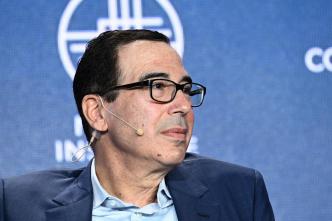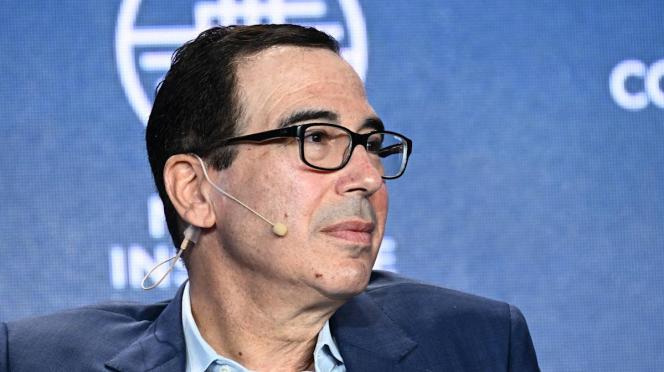How influencers are making finance more accessible, from TikTok to YouTube
From knowing where to start investing your money to budgeting tips and saving to buy a home, the world of finance and the complex terms used can feel overwhelming. This prompted more people — and particularly younger generations — to turn to social media for information.
While there are increasing efforts to improve financial education, there is still a low level of literacy around the subject. More than 23 million, or two-fifths, of UK adults have poor financial literacy, according to research from Abrdn (ABDN.L), published in July.
For a young person just starting to manage their own finances, finding out how to do in the best way can feel daunting if they haven’t had enough education on the subject. This can raise questions around how much to save into their pension or the best individual savings account (ISA) to choose, to name a few.
A recently published survey from BlackRock (BLK) and YouGov (YOU.L) found that there had been a rise in the number of people investing in the UK since 2022. This had been partly driven by a 30% rise in the number of those investing aged 25-34.
This builds on separate research showing growing interest in investing among young people. Research from the CFA Institute and the Financial Industry Regulatory Authority Investor Education Foundation (FINRA Foundation), published last year, found 81% of Gen Z investors surveyed in the UK said they began investing before they turned 21.
Finfluencer Award winners.
As this interest grows, many are turning to social media and financial influencers, or “finfluencers”, to help them understand this space. A quarter of 18-24 year olds in the UK used social media when searching for financial guidance, according to research from Deloitte, released in October 2023,.
In fact, the “FinTok” hashtag on TikTok had 4.7 billion views as of January 2024, according to a report from the Pensions Policy Institute. This encompasses a broad range of topics, including investment, credit and property.
Rich McDonald, who has more than two decades of experience in financial markets and has previously worked for Credit Suisse, decided to move into this space after he started running small classes during the pandemic.
“[I] got stuck in New Zealand over Covid and of course, that was 2020 when the space just exploded. It was so many people’s new interest in this crazy world that we have in investing,” he said on a panel at the 2024 Finfluencer Awards event on Tuesday, hosted by Yahoo Finance UK.
“So I started to small run classes of around 15 people. Really enjoyed it, really enjoyed the teaching side and decided, ‘Why stop at the personal classes? Let’s go for social media,'” he said.
————-
Read more: What are share buybacks?
McDonald’s TikTok channel “richmacrotrades” has 53,800 followers and he also presents a YouTube show for online trading platform, “Trade Live with IG”.
“When it comes to teaching people the complex world we live in, then I remember when I was at [hedge fund management firm] Brevan Howard we had this incredible email chain. So it was 2008-2009 financial crisis, right in the midst of it and the partners would cc everybody in, in the whole fund,” McDonald said. “And they’d be talking about what was going on, what they thought was going to happen next with rates, with bankruptcies and they explained it in such an easy way.”
McDonald said he’d worked with associates elsewhere that were “trying to make themselves sound cleverer, or part of a club, really getting it wrong and using far too technical terms.”
“So what chance do youngsters have, when we made it sound like it’s a private members club and that finance is really difficult, and you’ve got to be an intellect or have an MBA? It’s just not fair on the general population,” he added.
In terms of the role that finfluencers could have in improving financial literacy, McDonald emphasised the importance of “breaking it down into these nice bite-sized, easy to understand [pieces of information], using analogies that everybody has in their own life.”
The short-video format of TikTok requires those posting to break explanations down into more easily digestible chunks, while eye-catching visuals can also make them easier for viewers to understand.
Read more: What UK wealth managers and investment platforms want to see in the budget
Speaking on the same panel, Adam Lees, head of marketing at exchange-traded funds (ETFs) investment platform InvestEngine, said that an important component of the finfluencer space was their connection to audiences in getting more real-time feedback on content.
“I think we both worked at big financial institutions where you put out a bit of marketing and you don’t really know how well it’s been received, whereas a lot of the finfluencers in this room will all have their communities that they engage with every single day,” Lees said. “They understand exactly what’s needed, exactly what their community’s looking for.”
“So that content is created almost by the community,” he said.
There has been increased regulatory scrutiny of the space, with the UK’s financial watchdog announcing a crack down on “illegal finfluencers” this week.
The Financial Conduct Authority (FCA) said on Tuesday that it was interviewing 20 finfluencers under caution, as it launched “targeted action against finfluencers who may be touting financial services products illegally”.
The regulator highlighted that a growing number of young people were falling victim to scams, saying that finfluencers often played a part. The FCA said 62% of 18- to 29-year-olds follow social media influencers, with 74% saying they trusted their advice. Nine in 10 young followers had been encouraged to change their financial behaviour, it added.
Read more: UK house prices rise but most owners are pricing to sell
Steve Smart, joint executive director of enforcement and market oversight at the FCA, said: “Finfluencers are trusted by the people who follow them, often young and potentially vulnerable people attracted to the lifestyle they flaunt.
“Finfluencers need to check the products they promote to ensure they are not breaking the law and putting their followers’ livelihoods and life savings at risk.”
Touching on this at the Finfluencer event on Tuesday, McDonald said: “With what’s happening at the moment, it’s scary for us all right? The FCA doing what they’re doing and rightly so, still makes us a little bit scared of what we’re putting out and makes us check it really carefully.
“I would love to work with the FCA and get a really responsible ideas for us all on how to move forward safely and not be getting a knock at the door.”
Given the popularity of finfluencers among younger generations, versus potentially more traditional sources of financial information, it appears this is not just a short-term trend. At the same time, regulation around the sector is key to ensure users are viewing content made by those acting in their best interests.
Download the Yahoo Finance app, available for Apple and Android.









